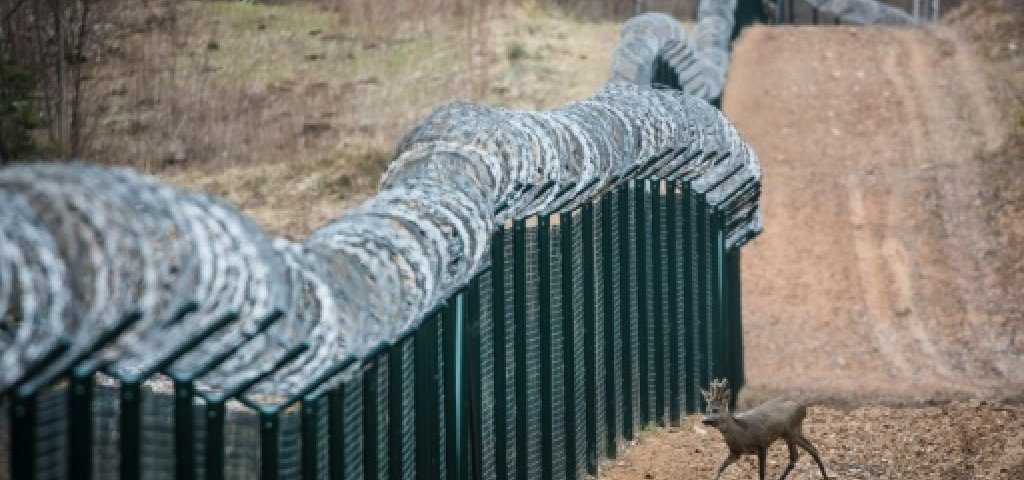A Latvian border guard helicopter hovers over a vast forest split by a long, narrow strip of sandy land where a fence topped with barbed wire marks the EU’s border with Russia.
Fifteen years after Latvia joined both NATO and the European Union, the Baltic state’s remote Latgale region — closer to Moscow than to Brussels — is among the bloc’s poorest areas, but its residents are staunchly pro-European.
Smuggling cheap alcohol and cigarettes from Russia has been a mainstay of the local economy since Latvia regained its independence in 1991 after a half century of Soviet occupation.
A growing stream of illegal migrants crossing over from Russia, mostly from Vietnam, Sri Lanka, Afghanistan and Syria, prompted Latvian authorities to start building the fence in 2016 to protect a 300-kilometre (186-mile) stretch of the EU’s eastern border.
As Latgale gears up to vote in European Parliamentary elections on May 25th, locals may differ on the candidates they choose, but there is no doubt that pro-European sentiment prevails overall, largely thanks to the EU’s generous development subsidies and open markets.
A eurozone member of 1.9 million, Latvia has absorbed a net 7.2 billion euros ($8.1 billion at the current rate) in EU subsidies since 2004, making it the bloc’s fourth-largest beneficiary per capita.
– ‘More European’ –
Nestled deep in the forest, Zilupe — population 3,000 — is one of the EU’s easternmost municipalities.
“The European Union is helping us like nobody before,” Skaidrite Marcenoka, a local farmer and municipal official, told AFP as she reflected on Latvia’s turbulent history.
Over the last century, Latvians suffered under Soviet and Nazi occupation which brought the Holocaust and then Stalinist-era mass deportations to Siberia.
Forced Russification and atheism during nearly half a century of Soviet rule was intended to strip Latvians of their language and cultural identity.
“Now, we’re receiving EU farming subsidies for agricultural machinery, better livestock and farm development,” said Marcenoka, who has used the payments to buy new equipment to run her 150-hectare farm.
Classified as “green” or eco-friendly, it receives around 230 euros for every hectare per year in direct EU farm payments.
“On average, the EU covers around 40 percent of agricultural investments,” Marcenoka adds.
She also breeds Latvia’s traditional brown cows with Limousine and Charolais bulls from France, saying that “this way my own livestock becomes more European”.
– Public works, open markets –
Heading west away from the Russian border, vast forests give way to small patches of farmland and the occasional village or town able to overhaul often rickety public infrastructure thanks to EU funding.
“Over the last decade, we’ve received 16.2 million euros in EU funding for 90 different projects,” says Edgars Mekss, the mayor of Ludza, a poor rural town of 12,000 people.
“For every euro we spend for street repairs, construction works, laying water pipelines, church and synagogue restoration, we receive 4.7 euros from European coffers.
“Our border region won’t be able to develop and create new jobs without it,” he adds, although some critics warn that a lack of oversight on how funds are spent raises the risk of graft.
For Andris Mejers, business is booming even without subsidies.
Latvia’s geopolitical shift from Moscow to Brussels has opened new, lucrative markets for his traditional Latgalian sausages, hams and smoked bacon.
“We take our simple rural food and travel all around the EU to various food fairs,” he tells AFP.
“In the past, we visited St Petersburg and Moscow; now that border seems closed but others have opened,” he says, pointing to fellow EU members Germany, Poland and Sweden.
“I even went to Brussels with my sausages! All the documents by local authorities confirming the quality of my products are recognised internationally.”
– Unpredictable –
Committed eurosceptics are few and far between in Latgale and elsewhere in Latvia, where the latest Eurobarometer poll suggested support for EU membership stands at 73 percent.
Fridijs Bokiss, a Communist-era mayor of Ludza who co-founded the Socialist Party of Latvia after the Communist Party was outlawed, rails against NATO, but he expresses no such disdain towards the EU.
NATO ramped up its presence on its eastern flank since Russia’s 2014 annexation of Crimea from Ukraine, setting up multi-national battle groups in Poland and the three Baltic states.
Polls show that around 60 percent of Latvians supports the alliance.
“We must leave NATO to have a good relationship with Moscow and then reap benefits from both the EU and Russia,” he told AFP but was unable to name the rewards Latvia might receive from closer ties to Russia.
“We have a cross-border cooperation initiative with the Pskov region in Russia named Ezerzeme (‘Lakeland’), but even that is financed by the EU,” he admitted.
His views are so unpopular that his Socialist party sees no point in running in the European Parliament election later this month.
Turnout is expected to exceed the 30 percent recorded in the 2014 ballot.
“I’ll vote because I live in the proximity of (Russian President Vladimir) Putin’s Russia, and Putin is like a novice driver at the wheel: you’ll never quite know what he’ll do next!”, Ilmars Ostrovskis, a Latgale businessman, told AFP.





